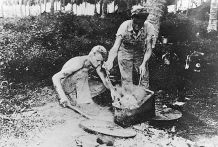R. Relievo (Rob Blurton)
R. Relievo (Rob Blurton)
R. Yamada
Bombing Civilians
A moral surrender to the Nazis? (Letter exchange)

After reading your articles in FE #345, Winter 1995 on the dropping of the atomic bombs on Japan, I couldn’t help but feel a little bit of historical and moral context was needed to balance the distortion contained therein.
Apr 17, 2016 Read the whole text...
Peter Werbe
R. Relievo (Rob Blurton)
Hiroshima, First Shot of World War III
As E.B. Maple points out in the following article (which first appeared in FE #285, August 1977), the atomic bombings of civilians by the American Army Air Corps at the end of World War II was not the knockout punch that convinced an intransigent Japan to suddenly change its strategy and surrender.
Jun 11, 2020 Read the whole text...
R. Relievo (Rob Blurton)
Kronstadt 1921
Bolsheviks Crush the Best of the Russian Revolution
For three-quarters of a century, anarchists and other opponents of the 1917 Bolshevik putsch and subsequent counterrevolution have cited the uprising of the mutinous Baltic Fleet sailors and garrison soldiers at Kronstadt as one of the final social eruptions of the Russian Revolution.
The March 1921 events at the naval base on Kotlin Island, situated in the Gulf of Finland twenty miles west of St. Petersburg, are one of the landmark occurrences in the history of revolutionary resistance to the authoritarian state. In the wake of Kronstadt’s suppression, Lenin and his cabal were left in uncontested command of the solidified “dictatorship of the proletariat.”
May 7, 2020 Read the whole text...
